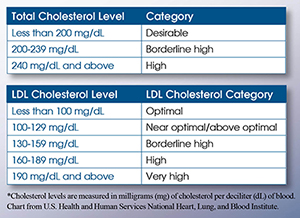Ask a Doc – High Cholesterol with Megan E. Miller, D.O.
 Question: As long as my weight is normal, is high cholesterol a real threat to my health?
Question: As long as my weight is normal, is high cholesterol a real threat to my health?
Answer: Cholesterol is a waxy substance that travels through the blood in units called lipoproteins. The body needs it to work properly, but should be monitored to ensure healthy levels. Too much low-density cholesterol (LDL), which contributes to plaque being deposited on artery walls, and too little high-density (HDL) cholesterol, which helps remove LDL from artery walls, can lead to heart disease, heart attacks and stroke. Many factors can raise cholesterol levels, including a diet high in saturated and trans fat and cholesterol, being overweight, smoking, alcohol consumption, lack of exercise, heredity, age and long-term stress.
According to the U.S. Department of Health and Human Services, everyone age 20 and older should have their cholesterol measured at least once every five years. Although individuals who are overweight are at a higher risk of having high cholesterol, people of all ages and weights should stay informed and take steps to maintain normal cholesterol levels.
When a person has too much cholesterol in the blood, over time, the buildup of plaque deposited on arterial walls can lead to narrowed and hardened arteries. This can cause blood flow to the heart to become slowed or blocked. A heart attack could result if a blockage prevents blood supply to a section of the heart.
Cholesterol is made from two sources: food and what is produced by the body. Dietary cholesterol is found only in animal products, such as eggs, liver, milk, cheese and beef. In order to improve cholesterol, it is important to follow a healthy diet with unrefined, whole-grain foods, low amounts of beverages and foods with added sugars, and low amounts of saturated and trans fats. It helps to choose lean meats and poultry without skin and prepare them without added saturated or trans fats. Try to select fat-free, one percent fat and low-fat dairy products. Eating fruits and vegetables, preparing foods with little or no salt, and increasing fiber in your diet are also helpful. An individual’s daily amount of cholesterol intake should be 300 mg or less.
In addition, exercise for 30 minutes a day at least five days a week, and look for opportunities to be active during the day, such as taking the stairs and parking your vehicle farther away from a location so you can walk. Always contact your primary care physician before beginning a new exercise program.
For some patients, following a healthy diet and exercise program is not enough to lower high cholesterol. A physician may prescribe medication that lowers cholesterol to be taken in conjunction with a healthier diet. Since high cholesterol often shows no symptoms, have your cholesterol panel checked on a regular basis according to your physician’s instructions. A full cholesterol panel includes total cholesterol, HDL, LDL and triglycerides. Triglycerides are a type of fat found in our bodies. High triglycerides also can raise the risk of heart disease. Normal levels for triglycerides are 150 mg/dL or less after a 12-hour fast.

HDL cholesterol protects against heart disease, so higher numbers are better. A level less than 40 mg/dL is low and considered a major risk factor for developing heart disease. HDL levels of 60 mg/dL or above helps lower your risk for heart disease.
Megan Miller, D.O., joined Licking Memorial Health Systems (LMHS) as a family physician at Licking Memorial Family Practice – Hebron in March 2005. Dr. Miller earned her Doctor of Osteopathic Medicine degree from the Ohio University College of Osteopathic Medicine in Athens, Ohio. She completed her internship and residency with St. Vincent Mercy Medical Center in Toledo, Ohio. She is board certified in family medicine.
Dr. Miller is a member of the American Osteopathic Association and the American College of Osteopathic Family Physicians. Appointments can be made by calling (220) 564-7930.
| Posted On : 9/8/2015 10:30:44 AM
Filed under: